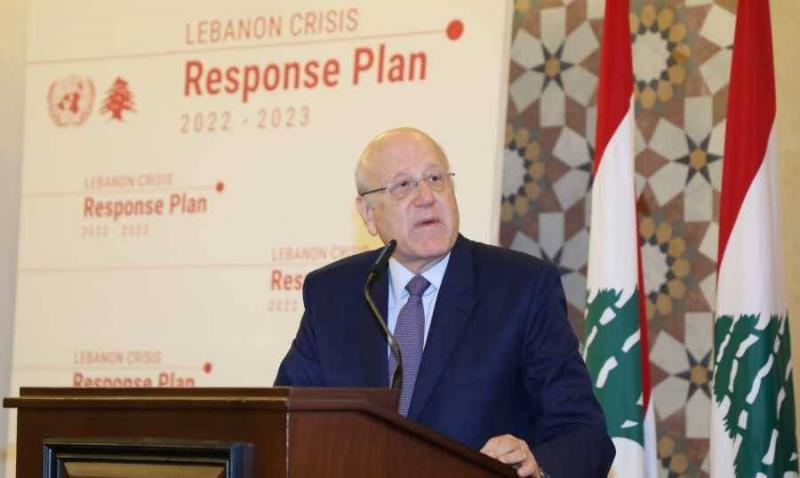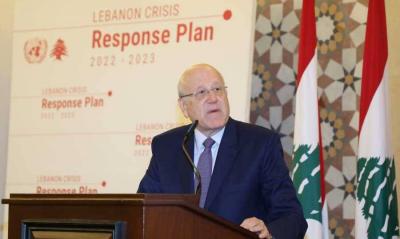Awaiting the conclusion of the second stage of consultations with the designated Prime Minister Najib Mikati and parliamentary blocs, independent deputies, and the Economic and Social Council, which will end this afternoon in the Square of Stars, he will then move to release a "desired cabinet formation" according to the consultations and tasks expected within no more than four months, including the anticipated month for formation. This is amid obstacles, particularly the expected conditions from the Strong Lebanon bloc led by Deputy Gibran Bassil, according to "Al-Liwaa".
The designated Prime Minister, while "hurrying" behind both his difficult and easy cabinet formation due to several significant blocs refraining from participation—from the Democratic Gathering bloc to the Lebanese Forces bloc and the Change bloc, possibly including the Free Patriotic Movement—harbors memories of forming the resigned government after the elections and how to "smooth things over" during that time. However, the differences between September 10, 2021, the date of the issuance of the decree forming the third government under number 8376, after the binding consultations on July 26, 2021, cannot be overlooked or ignored.
1. President Mikati received 72 votes out of 118 deputies who named him in the previous council, where he was a deputy with a parliamentary bloc.
2. In the 2022 Council, President Mikati received 54 votes, a reduction of 18 votes following the loss of his parliamentary block, as well as the absence of former Deputy Saad Hariri's bloc, which had fully named him.
3. In the current resigned government, the Progressive Socialist Party nominated Minister Abbas Al-Halabi, while Prince Talal Arslan named Issam Sharaf al-Din, the Minister of Displaced in the caretaker government, who is likely to leave the government.
4. In the previous council, there was no Change bloc consisting of 13 deputies that participated in the consultations and announced that it would not participate in a national unity government or any other government, demanding, through Deputy Halima Hujar, "a small and rescue government," rejecting the logic of quotas.
5. The Lebanese Forces bloc, which spoke of conditions that cannot be applied during the last three months of the presidential term, considered that the priority should be the election of a new president of the republic, with Deputy Georges Adwan rejecting participation, while calling for "strict monitoring" of the upcoming government.
6. Only Hezbollah demands a government that includes everyone, but they criticized those who boycotted the consultations and blamed others.
7. Before the stance of the Strong Lebanon bloc, Deputy Speaker Elias Bou Saab (who belongs to the Strong Lebanon bloc) stated that "it is impossible to form a government without political representation."
If the designated president will continue today his meetings with the Strong Lebanon bloc and independent deputies, the consultations, although not constitutionally binding, are politically obligatory for the designated president. Otherwise, obstruction will prevail in the formation, regardless of President Mikati's promise to present a new or amended government formation that revives the government for rescue purposes, as the essence remains in the execution.
Political sources described the atmosphere surrounding the formation of the new government as nebulous, amidst the continued insistence of Deputy Bassil to bind President Mikati's task with an array of known, impossible conditions to fulfill, despite all attempts at obstruction, extortion, and relentless exchange offers. The sources revealed that contacts and political consultations to resolve disagreements and align views between the designated Prime Minister and Bassil have not taken place until now and may not happen at all, considering that the consultation will be limited between the presidents of the republic and the government based on the constitution, while no movement from Hezbollah between the two parties has yet emerged, amidst a series of criticisms and positions voiced by some party leaders and deputies against those obstructing the formation of the government, along with repeated calls not to raise the ceiling of demands in the formation process, which the sources viewed as negative signals against the head of the Free Patriotic Movement.
The sources noted that the elevation of demands by Bassil to such a level, knowing well its impossibility of acceptance and execution, aims to disrupt all attempts to form the new government and definitively block the way for the formation process, while keeping the caretaker government in its position until the presidential elections conclude and the new president assumes his constitutional duties.
Informed political sources told "Al-Liwaa" that President Michel Aoun is waiting for the results of the parliamentary consultations to be briefed by designated Prime Minister Najib Mikati. They confirmed that both presidents will review these results and that it is not true that there is a ready government formation that President Mikati will present to President Aoun. They clarified that the file of government formation still requires discussions, arranging names, allocating ministries, and involving other forces, especially those that named Mikati in the designation. However, the sources emphasized that this matter is not yet settled, and the issue of modifying the current government awaits an agreement with the president, who desires a swift government formation.
They stated that starting yesterday, demands regarding government formation began and are expected to continue as part of the formation process, even if the ministerial amendment is prevailing.
On the other hand, informed sources told "Al-Anbaa" that Mikati has set his political plan based on two options: either a ministerial amendment, which means a government similar to the current one in its composition and balances, and the change may take time for Energy Minister Walid Fayad, as Mikati seeks a minister who approves the electricity plan without reservations or demands, and Foreign Minister Abdullah Bou Habib, who has faced political, administrative, and financial pressures, in addition to Najla Riachi (Minister of Administrative Development), who is seeking to join her family abroad. The sources stated that the election results necessitate changes in Sunni ministers as well as in Druze representation while keeping Shiite representation as it is.
The second option is to activate the caretaker government if the amendment fails and all avenues for forming a new government are closed.
For its part, "Al-Qabas" noted that designated Prime Minister Najib Mikati is expected to conclude his non-binding parliamentary consultations for forming a government by the end of the term today, Tuesday, to begin political consultations with the key parties throughout this week, hoping that the government will see the light before the Eid al-Adha holiday. Follow-up sources repeated that unless the government is formed before Eid, it will become difficult to form it afterward, specifically before the Gulf-American summit attended by President Joe Biden in mid-July, and as a consequence during the period separating the end of President Michel Aoun's term, which means relying on the caretaker government led by Mikati.




